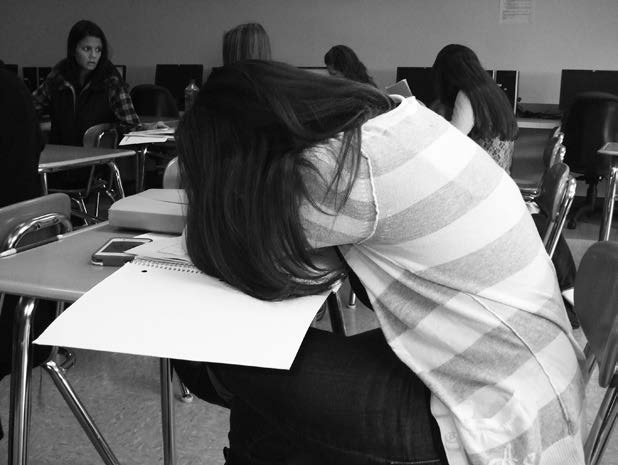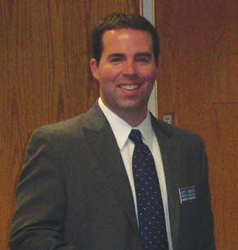The Effects of Sleep Deprivation on Students

They are everywhere: walking zombies roaming the halls on their way to class in a trance-like haze. They are easy to spot, sporting heavy bags under their eyes, hair askew and wardrobe disheveled as if they got dressed with the leftover clothes scattered across their bedroom floor. Many can relate to this feeling, or appearance, because lack of sleep can affect anyone. Cramming for exams, staying up late to finish a paper due the next morning, or just having too much on the mind can affect sleep. If not kept in check, sleep deprivation can lead to many effects that can harm you in the long run if not taken care of when they first appear.
Sleep deprivation can be brought on by many differing factors. Kathy Maloney, Director of Health Services, said that some of the contributing factors are overuse of stimulants (caffeine-related drinks especially taken late in the day/night) anxiety and depression, and stress. Many of these indicators are evident in students’ lives. It is easy to point out the victims of lack of sleep in many classes as well. Maloney said that some other effects of sleep deprivation are falling asleep in class, irritability, bloodshot eyes, bags under the eyes, and inability to focus.
According to webmd.com, the average adult needs about seven to eight hours of sleep a night, though some can function on less. Many students view the weekend as a chance to recuperate and get caught up on missed hours of shut-eye. Maloney said, “There is a misconception that eventually people can ‘catch up’ on their sleep at some point in the future. College students especially perceive themselves and their health as invincible and that nothing bad is going to happen to them despite their lifestyle choices.”
Sometimes students go on nosleep marathons, staying up for consecutive days if need be. “When I was on tour with my band I was up for 48 hours,” said Michael Nobbs-Brown, communication major. More often than not, students just have too much on their minds at any given time, which halts them from falling asleep until the early hours of the day. “I think a lot when I’m trying to go to sleep, which causes me not to sleep. Also, I’ll go to bed after late night adventures and wake up early for work and what-not,” Nobbs-Brown said.
Establishing a healthy and steady sleep pattern is imperative if one pines to not yawn repetitively in class or take a nap that delays sleep even more. According to sleepfoundation.org, ‘sleep hygiene’ is the practice of activities needed to get quality shut eye and being attentive during the day. Examples such as designating your bedroom strictly for sleep and not watching TV, no heavy meals before bed, and exercising can help aid to an overall better sleep time.
There are major dangers that can stem from lack of sleep. “Sleep deprivation becomes serious when it begins to significantly affect activities of daily living and when it places the person and others at risk. One example is falling asleep at the wheel while driving,” Maloney said.
“Lack of sleep can also cause anxiety and depression as well as mood swings, change in appetite, decreased immunity, and lack of focus and attention. The latter especially will start to affect studies, concentration, retention and recall of information,” Maloney further added. “I often struggle to fall asleep whenever I am stressed out. Stress is the major contributor that seems to affect my ability to simply fall asleep,” Laura Dalton, a senior business major, said.
During those hours when others are off wandering in their own dreams and vices, some students lie awake, sleep eluding them at every corner. Dalton said when she cannot fall asleep she finds other things to occupy her sleepless hours. “I usually just end up watching TV or working on homework,” she said. Nobbs- Brown functions in much the same manner. “I just watch some television if I can’t sleep,” he said.
Through the idle minutes and hours before the sun comes up to bring a new day, countless students lie awake frustrated that sleep has evaded them yet again for another sleepless night. Sometimes there is little to do but just hope for sleep to overcome and drift off. “I close my eyes with my headphones on. It sometimes helps me drift to sleep,” Nobbs- Brown said. Sweet dreams.
PHOTO COURTESY of Tammy Sybel



